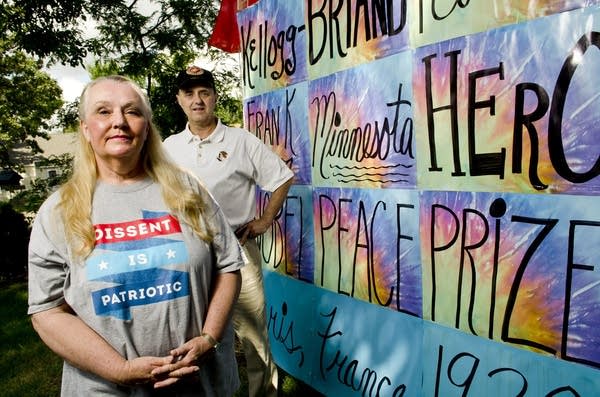Occupy movement inspires sign protest in Little Falls
Go Deeper.
Create an account or log in to save stories.
Like this?
Thanks for liking this story! We have added it to a list of your favorite stories.

From the street, it's a little hard to see Robin Hensel's house.
Behind an overgrown hedge, several dozen colorful cardboard signs dot the yard. Some are the size of a garage door, creating a fortress-like wall around the front of her house.
Most have political messages, among them "Labor can win, "It's time for a general strike," "Make corporations pay," and of course, "Occupy Wall Street."
Although Little Falls is more than 1,000 miles from the birthplace of the "Occupy Movement" in Lower Manhattan, Hensel has become a champion for the movement that began a year ago this week. Deeply influenced by the movement, she's fighting City Hall to keep up her personal protest on behalf of the 99 percent.
Turn Up Your Support
MPR News helps you turn down the noise and build shared understanding. Turn up your support for this public resource and keep trusted journalism accessible to all.
"All the issues that I was hearing about on the news and the things that were troubling to me were the things that I felt needed to be talked about," she said. "And people in this area would see what I was writing about, because I'm on the old highway here, and that it would start a bigger conversation."
Last November, Hensel received a notice from the city of Little Falls saying someone had complained about the signs, which the notice said violated the city's sign ordinance.
"Then I got a second letter saying that if I didn't take the signs down that I would be issued a ticket by the police," she said.
"I despise everything this woman stands for."
Not wanting to violate the law, Hensel took all but one of them down. It read: "Limited Free Speech."
In the months that followed, Hensel made her signs mobile by attaching some to her car, and became active in city politics by attending meetings.
But in May, she put the signs back in the yard on the advice of lawyer Larry Frost, an unlikely ally.
Frost offered to represent Hensel pro bono in a federal lawsuit claiming the city violated her free speech rights even though, he said, "I despise everything this woman stands for."
Hensel said she thought about it for a while before hiring the former Army intelligence officer. As odd as it may seem, the two say they've formed a sort of friendship.
"Politically I'm defending Robin's right to say those things," Frost said. "I don't agree with those things, but that's not the issue here."
Following Hensel's lawsuit, the city changed the residential sign ordinance. Instead of one sign with a two square-foot display, residents are now allowed two signs with a combined eight square feet of display. Unsatisfied with the change, Hensel and Frost say the new ordinance is still un-constitutional. Last week, they filed an amended complaint in U.S. District Court in Duluth.

Jason Kuboushek, a lawyer representing the city of Little Falls, said the city cannot and does not regulate the content of signs. However, he said like other Minnesota cities it regulates the size and number of signs.
"If you didn't have sign regulations someone could put up a billboard in a residential district," he said. "So the sign regulations protect the aesthetics of property value."
The city's new ordinance is largely based on a model sign ordinance from the League of Minnesota Cities. But unlike the model ordinance, the one in Little Falls is triggered by citizen complaints, an element that may provide Hensel and Frost with an opening, Georgetown University law professor Susan Low Bloch said.
Bloch said that for the most part the government cannot regulate the content of speech, but it is able to regulate how something is said.
The fact the city's ordinance is complaint driven, she said, subjects the city to claims that it is only used when an expression of speech is unpopular.

"If there's discretion then there's the possibility that the person exercising the discretion is making his or her decision on the basis of the content," Block said.
While the street demonstrations and tent cities that fueled the Occupy Movement have faded from public view, Hensel's enthusiasm hasn't.
"I'm going to continue airing things that are of concern in this area so that people will get more involved," she said. "I'd like those rooms down at City Hall to fill up. I'm really actually doing what my signs said. ... I asked others to occupy City Hall. I have been occupying City Hall."
Even if Hensel wins in court, it doesn't mean she'll be able to keep all of her signs.
Lawyers representing the city plan to ask a judge to dismiss the case. But if the judge rules Hensel's lawsuit legally sound, the case could move to trial sometime next year.







